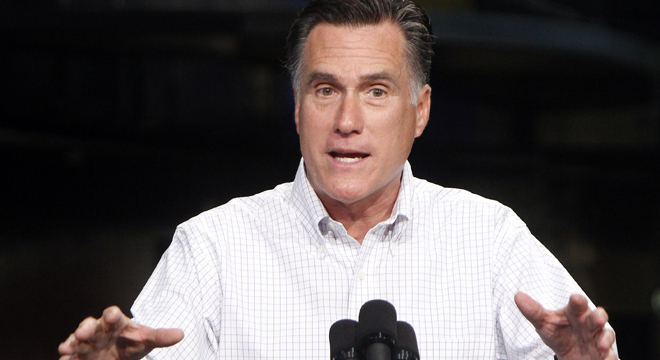Mitt Romney is still trying to convince voters that his health care plan, which includes repealing the Affordable Care Act, will protect people with preexisting medical conditions. But experts still say his claims don’t match reality.
His latest pitch? An open-enrollment period during which insurance companies would be require to sell coverage to uninsured consumers.
Call it a one-time amnesty for uninsured Americans suffering from illnesses, after which the GOP candidate says he’ll strengthen protections for sick people who maintain continuous coverage.
The Republican nominee floated the idea in an interview with the Columbus Dispatch editorial board published Thursday, saying the policy would guarantee ill Americans the “choice” to buy insurance during a limited time period.
What he didn’t specify: the length of the open-enrollment period. Nor did he say what would happen to sick people who cannot afford the prices set by insurers or those who fall sick — or are born — after the time window lapses.
“If the amnesty ever ends, the problem will just re-emerge,” said Austin Frakt, a health economist at the Boston University School of Public Health. “In part, that will happen because insurance may remain unaffordable without the subsidies that the ACA offers. An individual who can’t afford premiums will cease to have continuous coverage. What’s that person to do after this amnesty ends?”
Tim Jost, a professor of health law at Washington and Lee University, told TPM that covering preexisting conditions isn’t feasible without a mandate to purchase insurance and subsidies for those who can’t afford it — in other words, Obamacare. “If you don’t do those three things [market regulations, subsidies and a mandate] then it’s not going to work,” he said.
A Romney spokesperson did not immediately return a request to elaborate.
It’s far from clear whether the policy — which experts consider too vague to fully analyze — would meaningfully protect sick people or bring more of the uninsured into the system. What’s clear, though, is that the policy is far less robust than the ban on discrimination in the ACA.
Romney has faced criticism from President Obama for promising to repeal the ACA, including that ban. During the first presidential debate, Romney repeatedly insisted his health care plan covers preexisting conditions, although his own campaign later had to back off that claim and admit to the gaps in his proposal.
The open-enrollment window idea is intended to shield Romney from political vulnerability for proposing to enshrine the existing system. It comes alongside the Republican nominee’s vow to close gaps in existing law to protect those with preexisting conditions who regularly pay their premiums from being dropped from their policies if they change jobs.
“He keeps changing his plan,” Jost said. “He’s just making it up on the fly.”
Romney also — for at least the second time — downplayed the risks facing sick people without insurance coverage.
“We don’t have a setting across this country where if you don’t have insurance, we just say to you, ‘Tough luck, you’re going to die when you have your heart attack,'” he told the Dispatch. “No, you go to the hospital, you get treated, you get care, and it’s paid for, either by charity, the government or by the hospital. We don’t have people that become ill, who die in their apartment because they don’t have insurance.”
His remarks provoked a fierce retort from Obama’s reelection campaign.
“Time and time again, Mitt Romney has pledged to repeal Obamacare without offering a plan to replace it. And that’s because he just doesn’t have a clue about the struggles middle class families face when they don’t have health insurance,” said Obama spokeswoman Lis Smith. “If he did, he wouldn’t claim that no one in this country dies because they don’t have health insurance when, in fact, experts estimate that 26,000 people die prematurely every year because they don’t have coverage. If he did, he wouldn’t claim that all Americans with pre-existing conditions would be covered under his plan when, in fact, 89 million Americans who’ve had gaps in coverage would be left out.”










